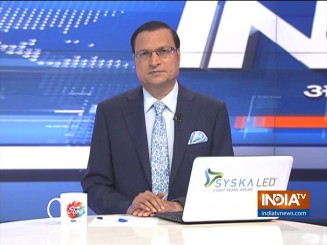 Watching Prime Minister Narendra Modi speak for 92 minutes on Independence Day from the ramparts of Red Fort reaffirmed my earlier view that he knows how to touch the pulse of the people. Modi refrained from political rhetoric and spoke on public issues that touched the people at large.
Watching Prime Minister Narendra Modi speak for 92 minutes on Independence Day from the ramparts of Red Fort reaffirmed my earlier view that he knows how to touch the pulse of the people. Modi refrained from political rhetoric and spoke on public issues that touched the people at large.
It was his sixth speech as PM from the Red Fort. Modi gave a quick analysis of what his government did during its first five year term, and what it has done in the first seventy days of his second term. Modi connects directly with the common man, and leaves the impression of a leader who does what he promises, and promises what he intends to do.
The decision to scrap Article 370 in Kashmir was a courageous one. Abolishing Triple Talaq practice by law was not an easy task. These were decisions which had wider political ramifications, and which earlier governments had shunned because of the political risks involved. But Modi is a leader who does not bother about political fallout, particularly when the issues relate to the interests of the nation and society.
One has to admit that Modi has got tremendous support from all sections of countrymen over the issue of scrapping Article 370 in Kashmir. He also got the support from most of the Muslim women, who have now been freed from the Damocles’ sword of Triple Talaq. Modi succeeds because his intentions are well meaning and there is clarity of will (neeyat saaf, iraade nek).
The most important point to note is that Modi realizes that he cannot succeed without massive support and cooperation from the people. Whether it was Swachhata Abhiyan or Jan Dhan Yojana, these could not have been successful without public participartion.
On Independence Day, the PM spoke of three new issues – one, population control, two, ban on use of plastic and polythene, and three, water conservation. He spoke of his intention to make laws and seek popular support on these issues. I would like to add to his appeal and request all of you to contribute your mite in achieving these three objectives. It will ultimately benefit all of us.
Controlling population explosion should be our topmost priority. The population of UP alone is more than the population of 114 countries. In 1947, India’s population was 32 crore, today it is going to touch 132 crore. Since land, water and natural resources in India are limited, we must take up this issue on a war footing. Everybody knows what happened during Emergency, when Sanjay Gandhi resorted to forcible sterilization. It is a good omen that Muslim ulema have come forward and offered their support to Modi on this issue. Let us all, irrespective of religion, decide that we should have small nuclear families.
The next issue concerns environment. Every day, 26,000 tonnes of plastic garbage is generated in India, out of which Delhi alone accounts for nearly seven tonnes. Polythene products are carcinogenic and they take a thousand years to decompose. Nearly one tonne of plastic garbage pollute our sea coast daily, endangering marine life. They are a threat to our environment both on land and water. All of us should vow to shun the use of polythene.
The third issue concerns water. Even after 72 years of independence, nearly 60 per cent of our people do not have access to clean drinking water. This in a country which gets the largest amount of rain water, but most of the flood water during the monsoon flow down to the seas and go waste. We should join hands to conserve every drop of water, because our ground water resources are depleting fast. Modi has created a separate Jal Shakti ministry which will oversee water conservation, recharging of ground water and work towards providing piped water to rural households by 2024.
Modi also spoke of ‘One Nation, One Election’. I wholeheartedly support his suggestion. For the last several years, he had been persuading political parties to agree to holding of parliamentary and all state assembly elections simultaneously.
In 1952, the first General Elections to both Lok Sabha and state assemblies were held simultaneously and this practice continued till 1967, when the era of coalition governments began and the Congress begun losing its monopoly over power. Presently, we find that there are state assembly elections almost at least twice a year and our Election Commission is busy holding assembly elections almost every year. This results in unnecessary electoral expenditure, policy paralysis in states due to enforcement of Model Code of Conduct, and populist promises made by political leaders to garner votes.
This poll cycle continues till the Lok Sabha elections, which take place every five years. These massive poll exercises result in heavy outgo from public exchequer. Many of the political parties are still not on the same page over this issue. Modi has now taken the issue to the people, so that voters themselves should pressurize their leaders to agree to the proposal of ‘One Nation, One Election’.
Click Here to Watch Full Video| Get connected on Twitter, Instagram & Facebook